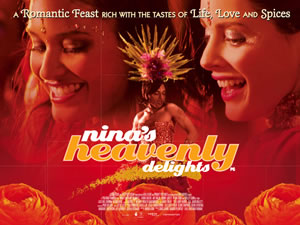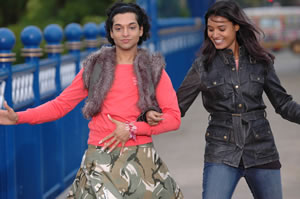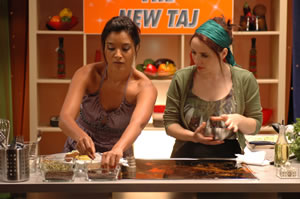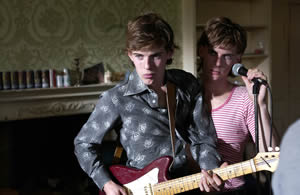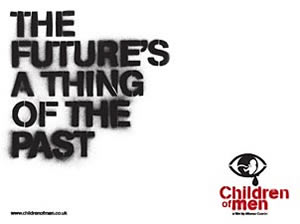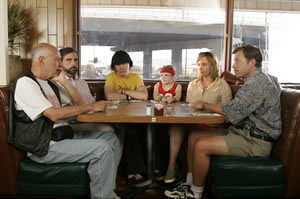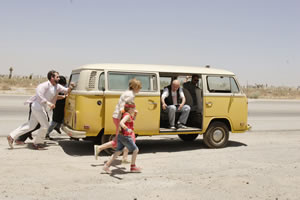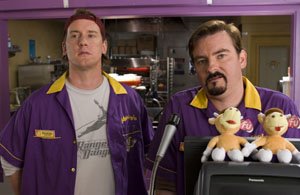Hoodwinked
Ever since Disney made his first animated feature, Snow White, fairy tales have been a popular source for children's and family movies. Disney sanitised the original tales for the delicate minds of American children, (the same ones that have grown into killers, but that's another discussion for another place). Terry Gilliam's The Brothers Grimm went some way to showing how dark fairy tales are, and Neil Jordan's The Company of Wolvesgave the story of Red Riding Hood a distinctly gothic and adult feel. Hoodwinked gives the same tale a more post-modern interpretation, which owes more to Shrek than anything else.
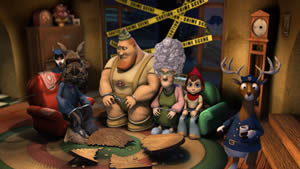
In this new animated version of the popular story, created and directed by Cory and Todd Edwards and Tony Leech, there is a thief that has been stealing the recipes from all the cooks of the forest, and Granny's collection is considered the best in the land. In order to stop it being stolen, Red decides to hide it in the bottom of a picnic basket and take it to her grandmother, who lives alone in the mountains. She is accompanied by a rabbit who has lost everything. Along the way they meet a wolf who wants to take away her basket, but Red escapes and eventually makes it to her grandma's cottage, where she finds the wolf disguised as her grandmother, while Granny is tied up in the closet. A bit of rough and tumble ensues until the axe-wielding woodsman crashes through the window. So far this sounds like the same old story except just at that moment the police arrive, lead by their Chief, Grizzly Bear and his assistants, the three little pigs (you see where this is going). The Chief is about to lock them all up when the suave, debonair frog detective, Nicky Flippers, arrives. Looking very much like a cartoon Poirot, but as everyone knows Poirot is Belgian and not a frog. Each of the suspects is interviewed and given a chance to tell their version of what happened up to the climactic moment, which leads Flippers to deduce who the real culprit is.
Like most contemporary Western animation this is of 3D CGI variety. Unfortunately it is not of a standard we have become used to from Pixar or Dreamworks, and it does look decidedly low-budget, along the lines of Jimmy Neutron. Saying that, I have seen some outstanding CGI animation that have been done on almost no budget, such as Rust Boy, which was made using cheap off-the-shelf software and a Mac.

Hoodwinked is saved by its script, and although the whole concept is not entirely original - there is a children's play called Wolfie that uses a very similar storyline - it does have some great moments of humour and plenty of film references to keep the adults amused. It also has a substantial voice cast including Anne Hathaway (Princess Diaries, Brokeback Mountain, Glenn Close (101 Dalmations, Mars Attacks, Jagged Edge, Jim Belushi (Red Heat) David Ogden Stiers ( MASH TV series) and Xzibit (MTV's Pimp My Ride) to deliver the gags.
It is flashy and fast-paced enough to keep kids entertained, with the dialogue being knowing enough to keep the adults amused. With the sometimes frenetic pace of the movie, the younger viewers aren't going to be too bothered by the quality of the animation.
It is an entertaining children's film, just not a highly original adaptation or with great animation. And that hyperactive squirrel seems somehow familiar.

In this new animated version of the popular story, created and directed by Cory and Todd Edwards and Tony Leech, there is a thief that has been stealing the recipes from all the cooks of the forest, and Granny's collection is considered the best in the land. In order to stop it being stolen, Red decides to hide it in the bottom of a picnic basket and take it to her grandmother, who lives alone in the mountains. She is accompanied by a rabbit who has lost everything. Along the way they meet a wolf who wants to take away her basket, but Red escapes and eventually makes it to her grandma's cottage, where she finds the wolf disguised as her grandmother, while Granny is tied up in the closet. A bit of rough and tumble ensues until the axe-wielding woodsman crashes through the window. So far this sounds like the same old story except just at that moment the police arrive, lead by their Chief, Grizzly Bear and his assistants, the three little pigs (you see where this is going). The Chief is about to lock them all up when the suave, debonair frog detective, Nicky Flippers, arrives. Looking very much like a cartoon Poirot, but as everyone knows Poirot is Belgian and not a frog. Each of the suspects is interviewed and given a chance to tell their version of what happened up to the climactic moment, which leads Flippers to deduce who the real culprit is.
Like most contemporary Western animation this is of 3D CGI variety. Unfortunately it is not of a standard we have become used to from Pixar or Dreamworks, and it does look decidedly low-budget, along the lines of Jimmy Neutron. Saying that, I have seen some outstanding CGI animation that have been done on almost no budget, such as Rust Boy, which was made using cheap off-the-shelf software and a Mac.

Hoodwinked is saved by its script, and although the whole concept is not entirely original - there is a children's play called Wolfie that uses a very similar storyline - it does have some great moments of humour and plenty of film references to keep the adults amused. It also has a substantial voice cast including Anne Hathaway (Princess Diaries, Brokeback Mountain, Glenn Close (101 Dalmations, Mars Attacks, Jagged Edge, Jim Belushi (Red Heat) David Ogden Stiers ( MASH TV series) and Xzibit (MTV's Pimp My Ride) to deliver the gags.
It is flashy and fast-paced enough to keep kids entertained, with the dialogue being knowing enough to keep the adults amused. With the sometimes frenetic pace of the movie, the younger viewers aren't going to be too bothered by the quality of the animation.
It is an entertaining children's film, just not a highly original adaptation or with great animation. And that hyperactive squirrel seems somehow familiar.
